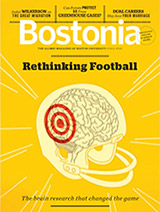Even those least interested in animal welfare might take notice when medical researchers decry the use of chimpanzees for research. In June, the National Institutes of Health (NIH) announced an end to funding for biomedical research on chimps and that it would safely
retire most of its lab-held chimps. The decision was partly pragmatic—scientists said the animals are not essential to most research—but it also reflected a humanitarian concern, expressed by the NIH director: “Chimpanzees are special creatures,” with “similarities to ourselves that are quite breathtaking.”
The NIH decision is nothing compared to what Steven Wise has in mind. Wise (LAW’76), the author of Rattling the Cage and Drawing the Line, plans to file a habeas corpus suit this fall against an as-yet-unidentified party on behalf of a captive chimpanzee, arguing that the ape should be released on the grounds that it deserves legal personhood.
Wise, who has taught animal rights courses at several law schools, is president of the Florida-based Nonhuman Rights Project, and the suit will mark the group’s first nonhuman client. He discussed his coming litigation with Bostonia.
Bostonia: This suit will involve a chimpanzee. Based on the latest animal cognition science, which other species merit legal personhood?
Wise: There are a million species of animals. I have studied fewer than a dozen. Based on my research and discussions with scientists, it appears likely that at least some great apes, cetaceans, and elephants possess cognitive abilities that the Nonhuman Rights Project believes are sufficient for legal personhood. This is not meant to be a comprehensive list.

Wise says we should act solely in the interests of animals, not of ourselves. Illustration by Chris Campisi
There’s worry that legal personhood for some animals might curb lifesaving medical research. Would it be legally tenable to confer some rights but still permit animals to be used in such research?
Whether medical research is lifesaving is not the criterion for determining whether an entity should be recognized as a legal person, with such fundamental legal rights as bodily liberty and bodily integrity, or whether she should be used as the subject of biomedical research. If it were, we would use human beings in biomedical research against their will. Rather, we look at the nature of the subject and whether she has the legal right not to be used.
Any being eligible for legal personhood and such fundamental legal rights as bodily liberty and bodily integrity may not be used in ways that disrespect their rights. A good rule of thumb is that a nonhuman animal possessed of fundamental legal rights may be used in biomedical research in the same way in which a human child may be used, with similar safeguards. Chimpanzees are so extraordinarily autonomous and intelligent that they should not be used in biomedical research or otherwise imprisoned, used, or exploited, except as would be a human child. The 2011 Institute of Medicine report and the 2013 actions of the National Institutes of Health halting the funding of biomedical research on chimpanzees and sending more than 80 percent of them to sanctuaries are a clear signal that their moral and legal status is rapidly changing.
If legal personhood required releasing animals from captivity, might that expose some species to extinction or near-extinction?
Legal personhood and fundamental legal rights for any animal require that we respect their individual legal rights and act solely in their interests, and not in ours. What that requires will depend upon individual circumstances.
I believe states exempt animal husbandry from their animal cruelty laws. If your suit prevails, would factory farming become illegal?
No. Our lawsuits have nothing to do with factory farming or with anticruelty laws.
Haven’t courts rejected previous efforts to remove animals from the realm of property? If your suit fails, would there be alternative ways to protect them from mistreatment?
To my knowledge, our upcoming lawsuit will be the first in history to demand that a nonhuman animal be declared a legal person with a legal right. We do not plan to file one lawsuit. This upcoming lawsuit will be the first salvo of an open-ended, complex strategic litigation campaign in which we will file as many lawsuits as we can financially support throughout the United States.
















































If chimpanzees – or any other species – have legal personhood and legal rights from them, then it would stand to reason that they have legal responsibilities as well.
Banning biomedical research on chimpanzees – or any other species – does not require legal personhood, it simply requires a law banning such research.
If mature chimpanzees have to work nine-to-five for their sustenance; if they are subject to the law like everyone else who has legal personhood; fine. But I doubt anyone’s going to be able to prove in court the bar of personhood in Heinlein’s short story “Jerry Was a Man”, which should be the bar to be reached – and even in that story, the chimpanzee had to be genetically modified to come even close to H. Sapiens.
http://www.willmorgan.org/Robert_A_Heinlein-Jerry_Was_A_Man.htm
“No. Our lawsuits have nothing to do with factory farming or with anticruelty laws.”
This is entirely unpersuasive. If animals shouldn’t be tested on because they possess cognitive abilities, why on earth should they be slaughtered in very gruesome ways if they possess the same cognitive abilities? If the NPR are successful, certainly other animals rights groups will use their victories in an unexpected manner.
I also hope that the NPR have a complex strategic political campaign to go with their legal campaign. The courts alone don’t have the power to make such sweeping changes in the law. http://lawblog.legalmatch.com/2013/12/10
Replying to Dave – As Steven Wise has stated, “Chimpanzees are so extraordinarily autonomous and intelligent that they should not be used in biomedical research or otherwise imprisoned, used or exploited, except as would be a human child.” He is not calling these animals “human” but is seeking to respect the chimpanzees in regard to their individual legal rights and act in their interests, and not in ours. Just because these animals cannot make a moral decision like a human, it does not mean that they should be subjected to biomedical research against their will and imprisoned. Life is precious and they have a right to enjoy freedom and happiness as well as humans, who can make decisions.
Interesting, but the author doesn’t ask the key question. Anything with a brain has cognitive abilities of some sort. A person is defined by the capacity to deliberate and make free moral choices for which they are responsible and which allows them to develop character. What evidence is there that chimps or any other primate does this?
Good luck to them; this is a wonderful effort.
I believe we will not be fully human until we start acting in a truly humane way. We have underestimated our animal brethren for far too long.